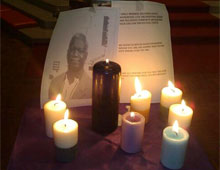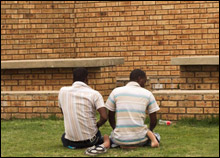 By Kuziwakwashe Zigomo
By Kuziwakwashe Zigomo
Zimbabwe’s years of economic mismanagement and political instability, especially in the last decade of the Zimbabwe Crisis, have had catastrophic effects on the national economy, much of which has left many of its once-vibrant sectors and industries significantly depleted (Kamidza 2009: 6). The formation of the GNU has since brought some stability to the economy, particularly through the implementation of the Short Term Emergency Recovery Programme that helped reduce rapid inflation levels as well as ensure the provision of basic commodities (though largely imported) that were scarce before. However, despite these improvements, many vital sectors such as health and education are still functioning well below their optimum capacity (Nkomo 2011). As a result, Zimbabwe continues to hang in the balance and the current government is struggling to develop sustainable policy alternatives to address the problems and challenges of the past. (Read more…)
Sun, April 1 2012 » Development, Zimbabwe Review » 1 Comment
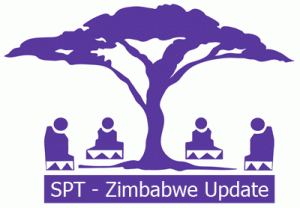 A great tragedy of the Mugabe regime has been the deconstruction of national institutions, which some analysts have mistaken for a ‘radicalised state.’ In effect Zimbabweans have witnessed a destructive form of vanguardist politics in which a particular party has claimed the right to speak for the majority and in so doing has turned its back on the establishment of stable, functioning national institutions, through which the generality of Zimbabwean citizens could hold those in power to account. In the process, on the one hand, the messaging from the most arrogant section of this elite has increasingly been couched in terms of a priestly imposition of a selective dogma, dressed in a nationalist cloth that provides precious little cover for most of the population. Additionally, through control over the centralised structures of coercion in the country, key members of the security sector have spawned informalised structures of violence that threaten once again to mar the prospects for a generally acceptable election outside of a fuller implementation of the GPA.
A great tragedy of the Mugabe regime has been the deconstruction of national institutions, which some analysts have mistaken for a ‘radicalised state.’ In effect Zimbabweans have witnessed a destructive form of vanguardist politics in which a particular party has claimed the right to speak for the majority and in so doing has turned its back on the establishment of stable, functioning national institutions, through which the generality of Zimbabwean citizens could hold those in power to account. In the process, on the one hand, the messaging from the most arrogant section of this elite has increasingly been couched in terms of a priestly imposition of a selective dogma, dressed in a nationalist cloth that provides precious little cover for most of the population. Additionally, through control over the centralised structures of coercion in the country, key members of the security sector have spawned informalised structures of violence that threaten once again to mar the prospects for a generally acceptable election outside of a fuller implementation of the GPA.
On the other hand the countries of the West, through an increasingly problematic sanctions regime, have added to the political gridlock in Zimbabwe in the guise of being the arbiters of global human rights. In the face of the inconsistencies in the application of the ‘right to protect’ by the Atlantic emporium in contemporary global politics, this potentially noble project is in danger of being cast as yet another form of imperial arrogance. (Read more…)
Fri, March 9 2012 » Elections, Zimbabwe Update » Leave a comment
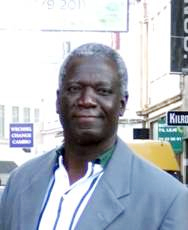
Paul Chizuze
A long established Zimbabwean human rights activist has been missing since 8 pm on Wednesday 8 February 2012.
Over the last three decades, Paul has been either employed by, or active with, the Legal Resources Foundation, Amani Trust Matabeleland, The Catholic Commission for Justice and Peace, ZimRights, Churches in Bulawayo, CivNet, and Masakhaneni Trust.
WHERE IS PAUL?
He allegedly left his home around 8 pm on 8th February, and what happened after this remains a mystery. He may have been murdered, hijacked or abducted by parties unknown.
His car, a white twin cab Nissan Hardbody Reg Number ACJ 3446 is also missing.
Paul has searched for other activists and never given up. We appeal to the police to pursue all the possibilities, and we in civics vow to maintain a campaign to find Paul wherever he may be.
- CHURCHES IN BULAWAYO
- GRACE TO HEAL
- LEGAL RESOURCES FOUNDATION
- MASAKHANENI TRUST
- RADIO DIALOGUE
- RESEARCH AND ADVOCACY UNIT
- ZIMBABWE HUMAN RIGHTS NGO FORUM
- ZIMBABWE CIVIC EDUCATION NETWORK TRUST
- ZIMBABWE LAWYERS FOR HUMAN RIGHTS
Mon, February 27 2012 » Human rights » 1 Comment
By Brian Raftopoulos
Viewing the broad spectrum of the political landscape in Zimbabwe at the end of 2011, one is left with the distinct impression that all the political forces are caught under a spell of indecision. The dilemmas of leadership renewal, electoral strategy and a broad vision for the future are all inducing a sense of hesitancy, that in the case of Zanu PF, manifests itself in renewed aggression and political hubris. Moreover if the Wikileaks reports have any validity this sense of uncertainty is not new, as all parties have, over the last decade,sought out the father confessor of the American Embassy to vent their fears and schizophrenic party psyches, none more so than the outwardly macho Zanu PF.
To start with Zanu PF, it is clear that the decision at the recent Bulawayo conference of the party to nominate Mugabe once again as the presidential candidate for the next election tells us a great deal about a party that is simply unable, at this stage, to visualise a regenerative strategy outside of its octogenarian leader. (Read more…)
Sun, December 18 2011 » Global Political Agreement » 1 Comment
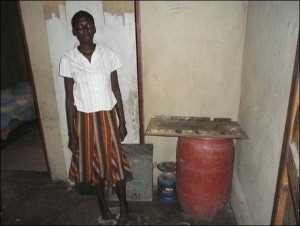
A pregnant woman stands in her empty kitchen, rural Gwanda, October 2011. “No food, no work, no money. If only I could get cattle to help me plough.”
SPT Report
Nationally, Zimbabwe is more food secure at the end of 2011 than it has been for several years. However, parts of Zimbabwe suffered serious crop failure earlier this year and a million people are still predicted to need supplementary feeding. In Gwanda, Matabeleland South, the authors found that almost half of households indicated a day without food in the recent past.[1] Only 17% of families reported eating three meals a day, meaning that 83% of households were, weeks before the onset of the official “hungry season in October”, already making food compromises daily. Grazing is critical, and people are traveling further to find water. This has been one of the hottest Octobers on record. Several families reported that baboons were killing and eating young goats and chickens, as the hunger now affects all living creatures in this area. Several families had no livestock left at all, not even one chicken.
(Read more…)
Wed, November 2 2011 » Human rights, Reports » Leave a comment




